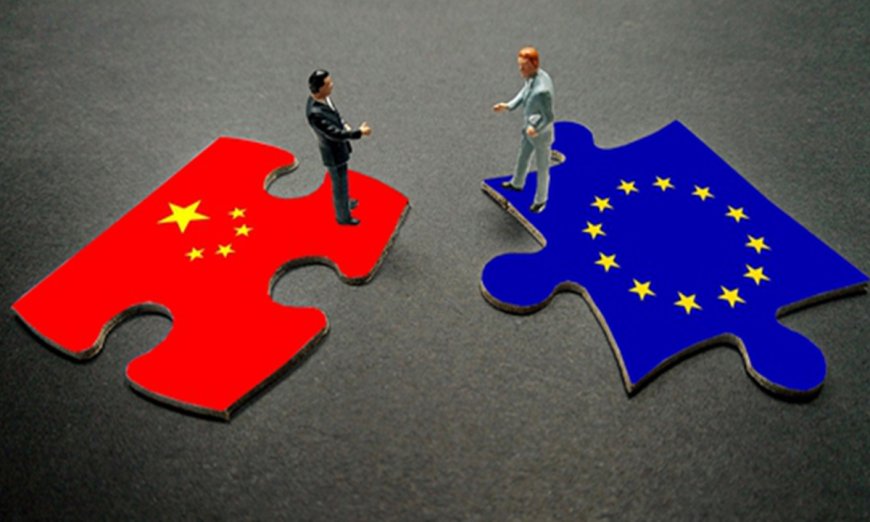Poor Europe!

By Amin Mahdavi
China is currently one of the most complex strategic challenges that transatlantic partners are facing. Great power competition, or "strategic competition" as the states say, is not limited to China. However, China's challenge has permeated a wide range of issues, both domestically and internationally, to such an extent that it is perhaps more complicated and important than any other challenge for America. In the meantime, Europe should define an independent role for itself, separate from the United States, in order to remain an important player in the international system.
There are tensions between Europe and the United States, with Washington frustrated by the EU's inaction toward China and, at times, its efforts to achieve greater strategic autonomy — a phrase often interpreted to mean independence from the United States. Despite these tensions and systemic competition between Europe and America on one hand, and China on the other, both sides of the Atlantic Ocean have a deep dependence on China.
From China's point of view, the United States is the main enemy, and China often tries to isolate European countries individually from the transatlantic alignment. China seeks to undermine this alliance by encouraging ideas such as "European strategic independence" that have the potential to damage transatlantic relations, as well as finding other ways to fuel intra-European tensions. China is trying to prevent the formation of a full-fledged alliance against itself by relying on the strengths of relations with Europe and trying to align them with itself.[1]
On the other hand, China, the United States, and the European Union are global competitors in the fields of trade, geopolitics, military, economy, and technology. These competitors try to maintain their superiority in various fields of advanced technologies and green technologies to remain as important global players.
But in the meantime, it seems that the actor under the most pressure is Europe. While they have very deep ties with the United States, they seek independence from the United States in various fields. At the same time, Europe is in close competition with China. Additionally, Europe defines China as an ideological threat because Chinese strategies and values do not align with European values, posing a great danger for Europe. Especially, China has cordial and warm relations with some European Union countries and can increase its influence in Europe, challenging European values such as democracy and posing a great challenge to the European Union.
Earlier last month, the United States imposed higher tariffs on a number of Chinese goods after a trade investigation. These US actions have three important consequences. First, these actions may be replicated by other countries, especially their allies, negatively impacting the renewable energy sector by limiting competition, reducing choices, and increasing the price of green goods, hindering the global move to decarbonize.
Second, recent U.S. actions, largely driven by electoral concerns, suggest that Washington is returning to full isolation from Beijing rather than merely "de-risking." This strategy represents a bipartisan consensus, with both parties trying to take a tougher stance.
Third, these actions emphasize a deliberate and intensified divergence in economic and trade relations between the two superpowers, increasing the possibility of economic and technological bifurcation.[2]
The increase in US punitive tariffs is a wake-up call to Europe about China's trade practices and their potential impact. The more the United States closes its market to Chinese products, the more China will need to divert huge volumes of its production to the EU, which remains a top export market.[3]
Therefore, the European Union, in line with the United States, has imposed tariffs on some Chinese products, but these actions are not under the pressure of the United States. Instead, they are to maintain the domestic market and competitiveness for the European Union. The EU is trying to strike a balance between industrial strength, sustainable innovation, and global trade dynamism. This union, while maintaining its competitiveness, will definitely not increase its dependence on China.
This action by Europe could provoke a reaction from China and lead to a major economic war, with the United States emerging as the clear winner. The United States aims to maintain its position as the world's largest economy and become Europe's top economic partner to exert greater influence over Europe and achieve its strategic goals, such as countering China or managing Russia.
Although the European Union has more ambitious decarbonization goals than the United States, it is heavily reliant on China to meet these goals. This dependency puts the EU in a challenging position, as Beijing could use its leverage to counter any efforts by the EU to protect its market. China's influence could manifest in various ways, such as challenging the EU's anti-subsidy investigation into Chinese electric vehicles at the WTO, questioning the EU's financial support for sectors like agriculture, or imposing tariffs on EU imports.
Overall, it appears that poor Europe [4]would be the loser in this economic battle between the two powers.













































